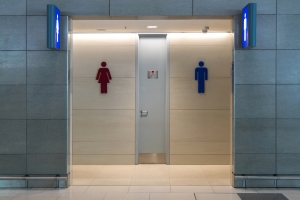The Employment Tribunal (ET) had to determine this in the case of Abbas v ISS Facility Services 2023. The employer in question was a facilities management services provider with over ten thousand employees in the UK. Ms Abbas worked for the company, and was the only female staff member working at the site in which she was based.
Abbas v ISS Facility Services – The Background
Toilet facilities on the site in which Ms Abbas worked comprised a male toilet with open urinals and a singular cubicle toilet, as well as a single accessible toilet. She was instructed to use either of the available toilets, and complained about a failure to provide an exclusive female-only toilet as a result.
The doors on the toilet did not have locks, so it could easily be opened from the outside by male employees. The hygiene in the men’s toilet was also reported as poor, with Abbas highlighting how there was often urine left on the toilet seats. The line manager agreed to fit a lock on the single toilet and placed a sign on the door – though this was only printed paper attached with tape. As such, the sign would often fall off and the employee had to repeatedly reattach the sign.
The employee continually complained about this situation, and – after 3 years, she raised a formal grievance. The complaint also included other workplace issue. Ms Abbas’ GP had signed her off from work for six months due to stress. While off from work, her employer refurbished the toilets and added secure locks. Even though she was satisfied with these improvements, Abbas decided to still file a direct sex discrimination claim as she argued she was treated less favourably due to her sex.
Abbas v ISS Facility Services – The Decision
The Employment Tribunal upheld the claim for direct sex discrimination. To reach this decision, they followed the Employment Appeal Tribunal (EAT) decision in Earl Shilton Town Council v Miller 2023. In this case, female staff were forced to use male toilets whenever the female toilets were used by children from a playgroup who were in the same building. The EAT found that their failure to provide adequate toilet facilities for females compared to males amounted to less favourable treatment, and was direct sex discrimination as a result.
Furthermore, the Workplace (Health, Safety and Welfare) Regulations 1992 state that employers must provide separate toilets for men and women. For failing to provide equal facilities, Ms Abbas was awarded £15,000 for injury to her feelings – though this also included an element for sexual harassment due to a separate matter.
This article is for guidance and informational purposes only, and does not constitute legal advice. If you require any further assistance, please do not hesitate to contact the Quest Advice Line Service for free on 01455 852 028.






